虚拟语气练习题及答案解析
- 格式:doc
- 大小:186.00 KB
- 文档页数:23
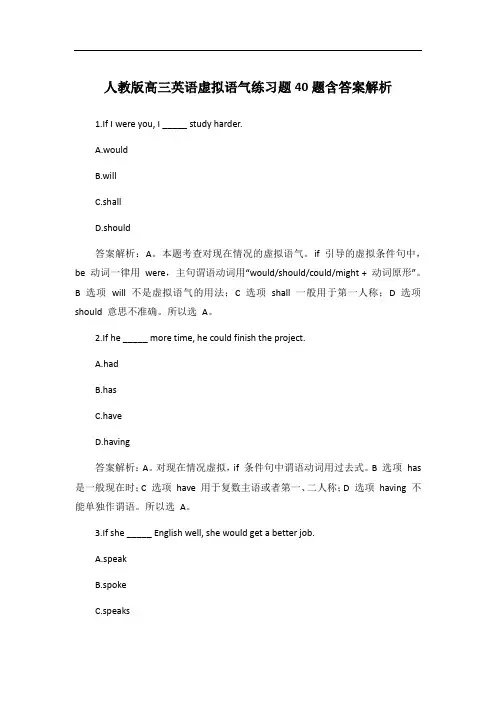
人教版高三英语虚拟语气练习题40题含答案解析1.If I were you, I _____ study harder.A.wouldB.willC.shallD.should答案解析:A。
本题考查对现在情况的虚拟语气。
if 引导的虚拟条件句中,be 动词一律用were,主句谓语动词用“would/should/could/might + 动词原形”。
B 选项will 不是虚拟语气的用法;C 选项shall 一般用于第一人称;D 选项should 意思不准确。
所以选A。
2.If he _____ more time, he could finish the project.A.hadB.hasC.haveD.having答案解析:A。
对现在情况虚拟,if 条件句中谓语动词用过去式。
B 选项has 是一般现在时;C 选项have 用于复数主语或者第一、二人称;D 选项having 不能单独作谓语。
所以选A。
3.If she _____ English well, she would get a better job.A.speakB.spokeC.speaksD.speaking答案解析:B。
虚拟语气对现在情况的假设,从句谓语动词用过去式。
A 选项speak 是一般现在时;C 选项speaks 是一般现在时第三人称单数形式;D 选项speaking 不能单独作谓语。
所以选B。
4.If we _____ in a different city, our life would be very different.A.liveB.livedC.livesD.living答案解析:B。
对现在情况虚拟,if 条件句用过去式。
A 选项live 是一般现在时;C 选项lives 是一般现在时第三人称单数形式;D 选项living 不能单独作谓语。
所以选B。
5.If they _____ to my advice, they wouldn't be in trouble now.A.listenB.listenedC.had listenedD.would listen答案解析:B。
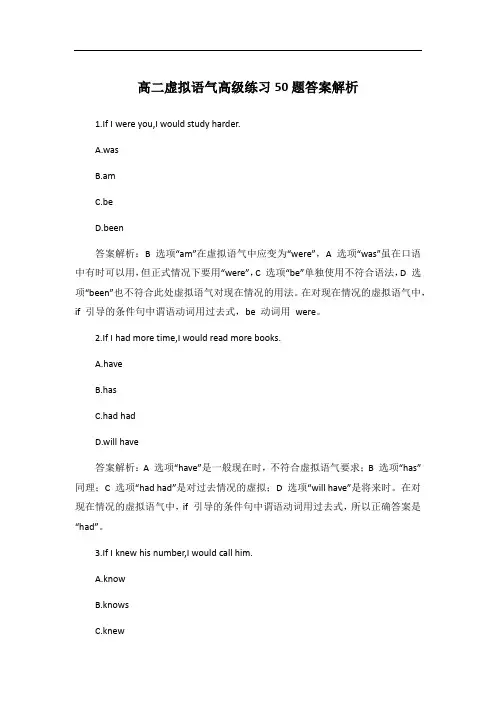
高二虚拟语气高级练习50题答案解析1.If I were you,I would study harder.A.wasB.amC.beD.been答案解析:B 选项“am”在虚拟语气中应变为“were”,A 选项“was”虽在口语中有时可以用,但正式情况下要用“were”,C 选项“be”单独使用不符合语法,D 选项“been”也不符合此处虚拟语气对现在情况的用法。
在对现在情况的虚拟语气中,if 引导的条件句中谓语动词用过去式,be 动词用were。
2.If I had more time,I would read more books.A.haveB.hasC.had hadD.will have答案解析:A 选项“have”是一般现在时,不符合虚拟语气要求;B 选项“has”同理;C 选项“had had”是对过去情况的虚拟;D 选项“will have”是将来时。
在对现在情况的虚拟语气中,if 引导的条件句中谓语动词用过去式,所以正确答案是“had”。
3.If I knew his number,I would call him.A.knowB.knowsC.knewD.knowing答案解析:A 选项“know”是一般现在时,不符合虚拟语气要求;B 选项“knows”是第三人称单数形式,也不符合;D 选项“knowing”不能单独作谓语。
在对现在情况的虚拟语气中,if 引导的条件句中谓语动词用过去式,所以答案是“knew”。
4.If I were a bird,I could fly.A.amB.wasC.beD.were答案解析:A 选项“am”在虚拟语气中应变为“were”;B 选项“was”在口语中有时可用,但正式情况下要用“were”;C 选项“be”单独使用不符合语法。
在对现在情况的虚拟语气中,be 动词一律用were。
5.If I had a car,I would go on a trip.A.haveB.hasC.had hadD.will have答案解析:A 选项“have”是一般现在时,不符合虚拟语气要求;B 选项“has”同理;C 选项“had had”是对过去情况的虚拟;D 选项“will have”是将来时。
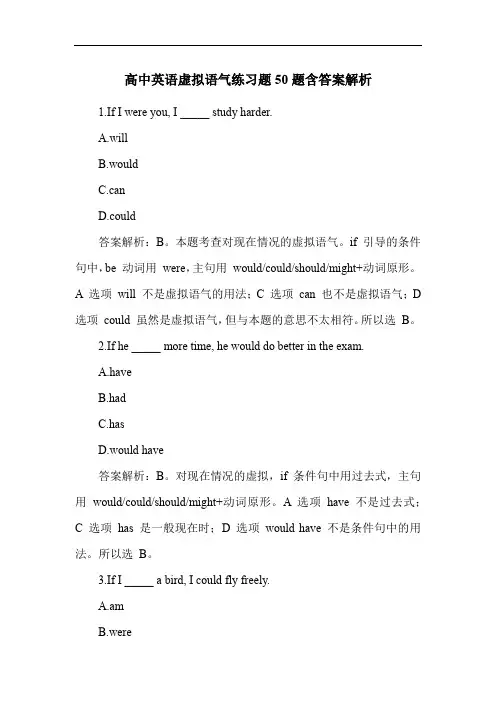
高中英语虚拟语气练习题50题含答案解析1.If I were you, I _____ study harder.A.willB.wouldC.canD.could答案解析:B。
本题考查对现在情况的虚拟语气。
if 引导的条件句中,be 动词用were,主句用would/could/should/might+动词原形。
A 选项will 不是虚拟语气的用法;C 选项can 也不是虚拟语气;D 选项could 虽然是虚拟语气,但与本题的意思不太相符。
所以选B。
2.If he _____ more time, he would do better in the exam.A.haveB.hadC.hasD.would have答案解析:B。
对现在情况的虚拟,if 条件句中用过去式,主句用would/could/should/might+动词原形。
A 选项have 不是过去式;C 选项has 是一般现在时;D 选项would have 不是条件句中的用法。
所以选B。
3.If I _____ a bird, I could fly freely.A.amB.wereC.wasD.be答案解析:B。
虚拟语气中,be 动词统一用were。
A 选项am 是一般现在时;C 选项was 一般过去时,但虚拟语气不用was;D 选项be 不是完整的动词形式。
所以选B。
4.If she _____ taller, she could play basketball better.A.isB.wasC.wereD.be答案解析:C。
对现在情况的虚拟,be 动词用were。
A 选项is 一般现在时;B 选项was 不是虚拟语气的正确用法;D 选项be 不是完整的动词形式。
所以选C。
5.If they _____ more careful, they wouldn't make so many mistakes.A.wereB.areC.wasD.be答案解析:A。
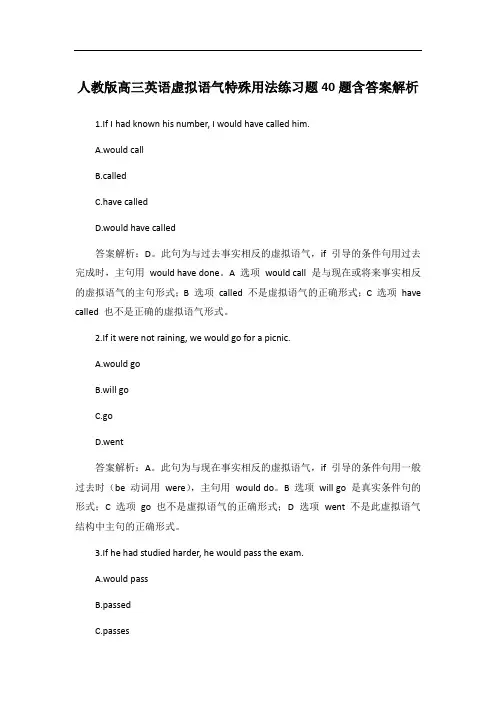
人教版高三英语虚拟语气特殊用法练习题40题含答案解析1.If I had known his number, I would have called him.A.would callB.calledC.have calledD.would have called答案解析:D。
此句为与过去事实相反的虚拟语气,if 引导的条件句用过去完成时,主句用would have done。
A 选项would call 是与现在或将来事实相反的虚拟语气的主句形式;B 选项called 不是虚拟语气的正确形式;C 选项have called 也不是正确的虚拟语气形式。
2.If it were not raining, we would go for a picnic.A.would goB.will goC.goD.went答案解析:A。
此句为与现在事实相反的虚拟语气,if 引导的条件句用一般过去时(be 动词用were),主句用would do。
B 选项will go 是真实条件句的形式;C 选项go 也不是虚拟语气的正确形式;D 选项went 不是此虚拟语气结构中主句的正确形式。
3.If he had studied harder, he would pass the exam.A.would passB.passedC.passes答案解析:A。
与过去事实相反的虚拟语气,if 条件句用过去完成时,主句用would have done。
B 选项passed 不是正确形式;C 选项passes 不是虚拟语气形式;D 选项will pass 也不是虚拟语气正确形式。
4.If I were you, I would take this opportunity.A.would takeB.takeC.will takeD.took答案解析:A。
与现在事实相反的虚拟语气,if 条件句用一般过去时(be 动词用were),主句用would do。
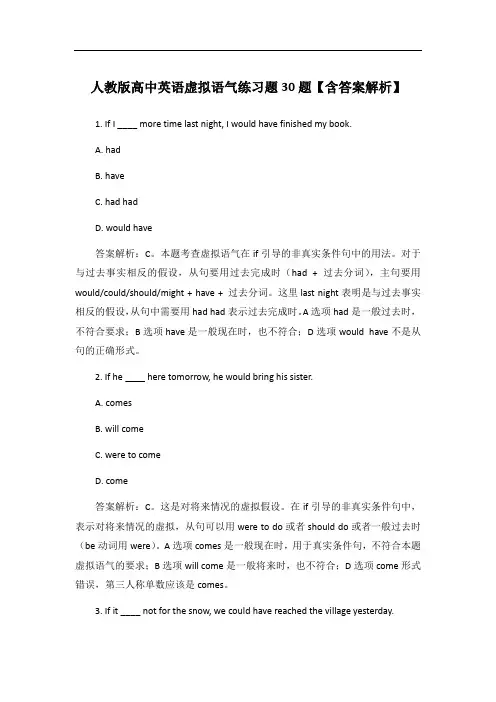
人教版高中英语虚拟语气练习题30题【含答案解析】1. If I ____ more time last night, I would have finished my book.A. hadB. haveC. had hadD. would have答案解析:C。
本题考查虚拟语气在if引导的非真实条件句中的用法。
对于与过去事实相反的假设,从句要用过去完成时(had + 过去分词),主句要用would/could/should/might + have + 过去分词。
这里last night表明是与过去事实相反的假设,从句中需要用had had表示过去完成时。
A选项had是一般过去时,不符合要求;B选项have是一般现在时,也不符合;D选项would have不是从句的正确形式。
2. If he ____ here tomorrow, he would bring his sister.A. comesB. will comeC. were to comeD. come答案解析:C。
这是对将来情况的虚拟假设。
在if引导的非真实条件句中,表示对将来情况的虚拟,从句可以用were to do或者should do或者一般过去时(be动词用were)。
A选项comes是一般现在时,用于真实条件句,不符合本题虚拟语气的要求;B选项will come是一般将来时,也不符合;D选项come形式错误,第三人称单数应该是comes。
3. If it ____ not for the snow, we could have reached the village yesterday.A. wasB. wereC. had beenD. is答案解析:C。
本题考查虚拟语气中的混合虚拟语气。
从句是与过去事实相反(因为yesterday),主句也是与过去事实相反。
在这种混合虚拟语气的情况下,从句要用过去完成时。
A选项was是一般过去时,不符合;B选项were用于现在虚拟或者将来虚拟(be动词在虚拟语气中一般用were),不符合这里与过去事实相反的情况;D选项is是一般现在时,完全不符合要求。
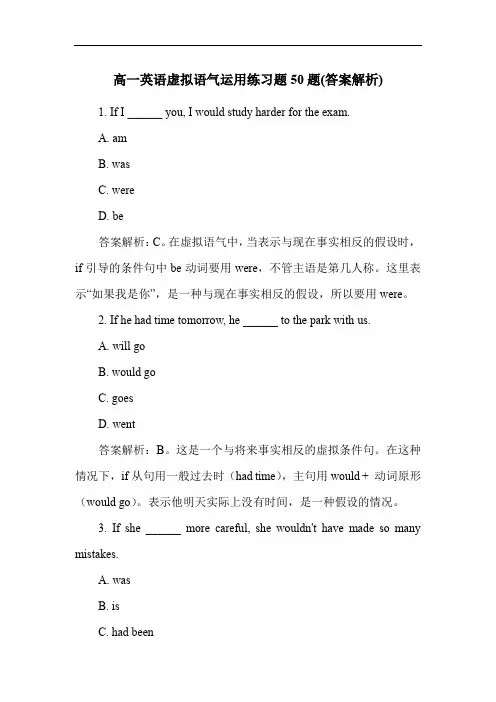
高一英语虚拟语气运用练习题50题(答案解析)1. If I ______ you, I would study harder for the exam.A. amB. wasC. wereD. be答案解析:C。
在虚拟语气中,当表示与现在事实相反的假设时,if引导的条件句中be动词要用were,不管主语是第几人称。
这里表示“如果我是你”,是一种与现在事实相反的假设,所以要用were。
2. If he had time tomorrow, he ______ to the park with us.A. will goB. would goC. goesD. went答案解析:B。
这是一个与将来事实相反的虚拟条件句。
在这种情况下,if从句用一般过去时(had time),主句用would + 动词原形would go)。
表示他明天实际上没有时间,是一种假设的情况。
3. If she ______ more careful, she wouldn't have made so many mistakes.A. wasB. isC. had been答案解析:C。
这是一个与过去事实相反的虚拟条件句。
主句用了wouldn't have made(表示过去不会做某事),所以if从句要用过去完成时had been,表示“如果她 过去)更细心的话”。
4. If it ______ rain tomorrow, we would go camping.A. doesn'tB. didn'tC. won'tD. wouldn't答案解析:B。
这是一个与将来事实相反的虚拟条件句。
在虚拟语气中,与将来事实相反时,if从句用一般过去时表示假设,这里表示“如果明天不下雨 实际上可能会下雨)”,所以用didn't。
5. If I ______ enough money, I would buy a new car.A. haveB. hadC. will haveD. would have答案解析:B。
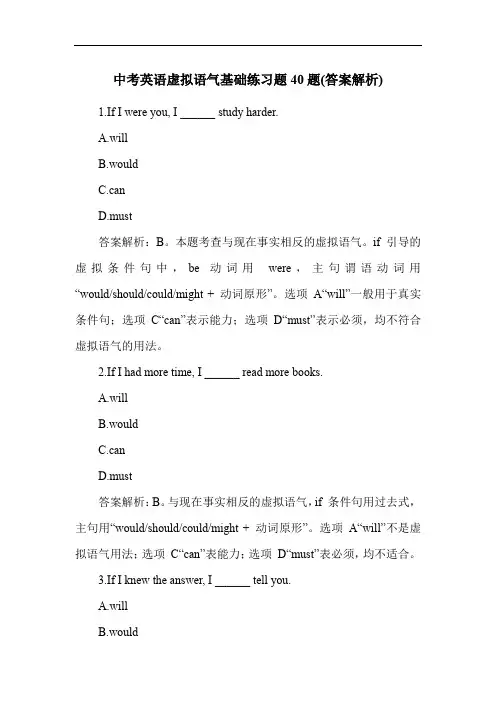
中考英语虚拟语气基础练习题40题(答案解析)1.If I were you, I ______ study harder.A.willB.wouldC.canD.must答案解析:B。
本题考查与现在事实相反的虚拟语气。
if 引导的虚拟条件句中,be 动词用were,主句谓语动词用“would/should/could/might + 动词原形”。
选项A“will”一般用于真实条件句;选项C“can”表示能力;选项D“must”表示必须,均不符合虚拟语气的用法。
2.If I had more time, I ______ read more books.A.willB.wouldC.canD.must答案解析:B。
与现在事实相反的虚拟语气,if 条件句用过去式,主句用“would/should/could/might + 动词原形”。
选项A“will”不是虚拟语气用法;选项C“can”表能力;选项D“must”表必须,均不适合。
3.If I knew the answer, I ______ tell you.A.willB.wouldD.must答案解析:B。
此句为与现在事实相反的虚拟语气,根据规则,主句用“would/should/could/might + 动词原形”。
选项A“will”不是虚拟语气的用法;选项C“can”表能力;选项D“must”表必须,都不对。
4.If I were a bird, I ______ fly freely.A.willB.wouldC.canD.must答案解析:B。
考查与现在事实相反的虚拟语气,按照规则,主句用“would/should/could/might + 动词原形”。
选项A“will”非虚拟语气用法;选项C“can”表能力;选项D“must”表必须,不合适。
5.If I had a magic pen, I ______ draw beautiful pictures.A.willB.wouldC.canD.must答案解析:B。
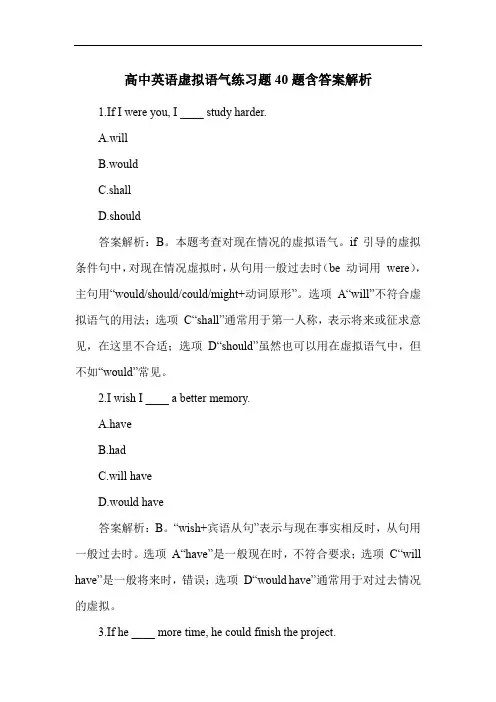
高中英语虚拟语气练习题40题含答案解析1.If I were you, I ____ study harder.A.willB.wouldC.shallD.should答案解析:B。
本题考查对现在情况的虚拟语气。
if 引导的虚拟条件句中,对现在情况虚拟时,从句用一般过去时(be 动词用were),主句用“would/should/could/might+动词原形”。
选项A“will”不符合虚拟语气的用法;选项C“shall”通常用于第一人称,表示将来或征求意见,在这里不合适;选项D“should”虽然也可以用在虚拟语气中,但不如“would”常见。
2.I wish I ____ a better memory.A.haveB.hadC.will haveD.would have答案解析:B。
“wish+宾语从句”表示与现在事实相反时,从句用一般过去时。
选项A“have”是一般现在时,不符合要求;选项C“will have”是一般将来时,错误;选项D“would have”通常用于对过去情况的虚拟。
3.If he ____ more time, he could finish the project.A.haveB.hadC.will haveD.would have答案解析:B。
本题是对现在情况的虚拟语气。
if 条件句中对现在虚拟用一般过去时,选项A“have”一般现在时错误;选项C“will have”一般将来时不对;选项D“would have”通常用于对过去情况的虚拟。
4.She talks as if she ____ everything.A.knowB.knewC.will knowD.would know答案解析:B。
“as if/though+从句”表示与现在事实相反时,从句用一般过去时。
选项A“know”一般现在时不符合;选项C“will know”一般将来时错误;选项D“would know”通常用于对过去情况的虚拟或表示不确定的将来。
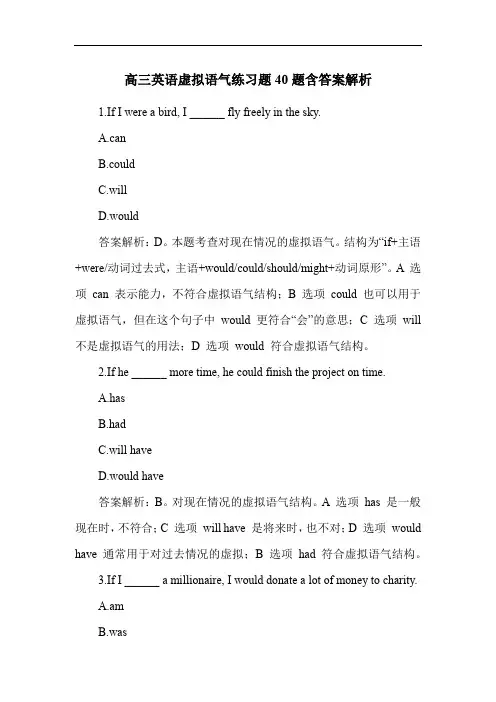
高三英语虚拟语气练习题40题含答案解析1.If I were a bird, I ______ fly freely in the sky.A.canB.couldC.willD.would答案解析:D。
本题考查对现在情况的虚拟语气。
结构为“if+主语+were/动词过去式,主语+would/could/should/might+动词原形”。
A 选项can 表示能力,不符合虚拟语气结构;B 选项could 也可以用于虚拟语气,但在这个句子中would 更符合“会”的意思;C 选项will 不是虚拟语气的用法;D 选项would 符合虚拟语气结构。
2.If he ______ more time, he could finish the project on time.A.hasB.hadC.will haveD.would have答案解析:B。
对现在情况的虚拟语气结构。
A 选项has 是一般现在时,不符合;C 选项will have 是将来时,也不对;D 选项would have 通常用于对过去情况的虚拟;B 选项had 符合虚拟语气结构。
3.If I ______ a millionaire, I would donate a lot of money to charity.A.amB.wasC.wereD.be答案解析:C。
虚拟语气中be 动词一般用were。
A 选项am 是一般现在时;B 选项was 通常用于特定情况;C 选项were 符合虚拟语气结构;D 选项be 不能单独使用。
4.If she ______ harder, she would get better grades.A.studiedB.studiesC.will studyD.would study答案解析:A。
对现在情况虚拟,动词用过去式。
B 选项studies 是一般现在时;C 选项will study 是将来时;D 选项would study 一般用于虚拟条件句中;A 选项studied 符合虚拟语气结构。
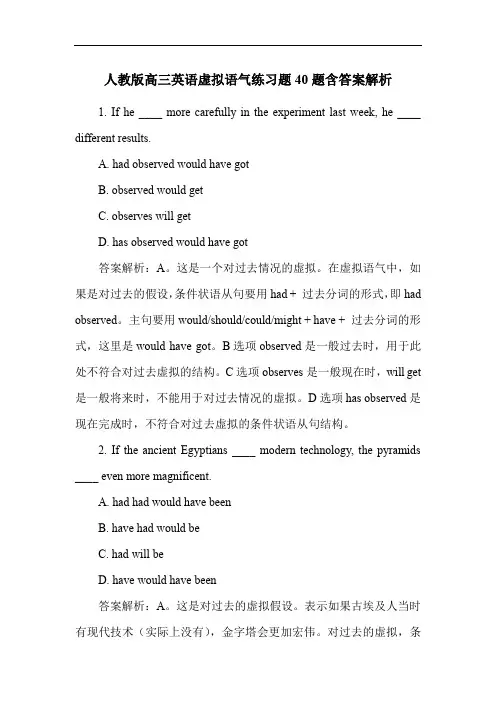
人教版高三英语虚拟语气练习题40题含答案解析1. If he ____ more carefully in the experiment last week, he ____ different results.A. had observed would have gotB. observed would getC. observes will getD. has observed would have got答案解析:A。
这是一个对过去情况的虚拟。
在虚拟语气中,如果是对过去的假设,条件状语从句要用had + 过去分词的形式,即had observed。
主句要用would/should/could/might + have + 过去分词的形式,这里是would have got。
B选项observed是一般过去时,用于此处不符合对过去虚拟的结构。
C选项observes是一般现在时,will get 是一般将来时,不能用于对过去情况的虚拟。
D选项has observed是现在完成时,不符合对过去虚拟的条件状语从句结构。
2. If the ancient Egyptians ____ modern technology, the pyramids ____ even more magnificent.A. had had would have beenB. have had would beC. had will beD. have would have been答案解析:A。
这是对过去的虚拟假设。
表示如果古埃及人当时有现代技术(实际上没有),金字塔会更加宏伟。
对过去的虚拟,条件句用had + 过去分词,这里是had had,表示“有”这个动作发生在过去的过去。
主句用would/should/could/might+ have + 过去分词,这里是would have been。
B选项have had是现在完成时,不符合对过去虚拟的结构。
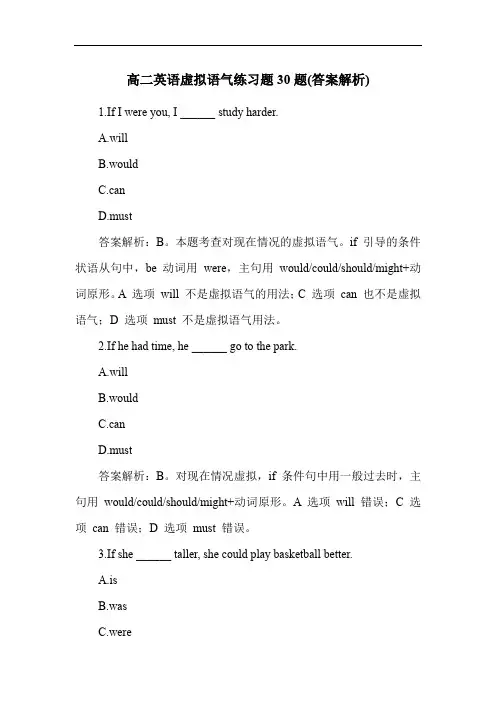
高二英语虚拟语气练习题30题(答案解析)1.If I were you, I ______ study harder.A.willB.wouldC.canD.must答案解析:B。
本题考查对现在情况的虚拟语气。
if 引导的条件状语从句中,be 动词用were,主句用would/could/should/might+动词原形。
A 选项will 不是虚拟语气的用法;C 选项can 也不是虚拟语气;D 选项must 不是虚拟语气用法。
2.If he had time, he ______ go to the park.A.willB.wouldC.canD.must答案解析:B。
对现在情况虚拟,if 条件句中用一般过去时,主句用would/could/should/might+动词原形。
A 选项will 错误;C 选项can 错误;D 选项must 错误。
3.If she ______ taller, she could play basketball better.A.isB.wasC.were答案解析:C。
对现在情况虚拟,be 动词在虚拟语气中一般用were。
A 选项is 不是虚拟语气;B 选项was 不用于虚拟语气中she 后面;D 选项are 不是虚拟语气。
4.If I had a car, I ______ drive to school every day.A.willB.wouldC.canD.must答案解析:B。
对现在情况虚拟,主句用would/could/should/might+动词原形。
A 选项will 不是虚拟语气;C 选项can 不是虚拟语气;D 选项must 不是虚拟语气。
5.If they ______ more money, they could travel around the world.A.haveB.hadC.hasD.having答案解析:B。
对现在情况虚拟,if 条件句用一般过去时。
高二英语虚拟语气练习题30题【含答案解析】1. If I _______ a bird, I would fly to every corner of the world.A. amB. wasC. wereD. be答案:C。
解析:在虚拟语气中,表示与现在事实相反的假设,if从句中的be动词要用were,不管主语是第几人称。
A选项am是一般现在时的形式,不符合虚拟语气规则;B选项was虽然在一般过去时中可以表示第一和第三人称单数的be动词形式,但在虚拟语气中要用were;D选项be是动词原形,也不符合虚拟语气的语法要求。
2. If he had studied harder last term, he _______ the exam.A. would passB. would have passedC. passedD. had passed答案:B。
解析:本题考查与过去事实相反的虚拟语气。
if从句用had + 过去分词(had studied),主句要用would + have + 过去分词(would have passed)。
A选项would pass是与现在或将来事实相反的主句形式;C选项passed是一般过去时,没有体现虚拟语气;D选项had passed是过去完成时,用于if从句中,不能用于主句。
3. If it _______ rain tomorrow, we would go for a picnic.A. doesn'tB. didn'tC. wouldn'tD. won't答案:B。
解析:这是与将来事实相反的虚拟语气。
在if从句中,形式为一般过去时(didn't rain),主句用would + 动词原形(would go)。
A选项doesn't 是一般现在时的否定形式,不符合虚拟语气规则;C选项wouldn't是will的过去式的否定形式,不能用于if从句;D选项won't是一般将来时的否定形式,也不符合要求。
1 虚拟语气讲解与练习 黄志刚2013.10. 一. 简介 `虚拟语气用来表示说话人的主观愿望或假想,而不表示客观存在的事实,所说的是一个条件,不一定是事实,或与事实相反。
虚拟语气通过谓语动词的特殊形式来表示。英语中的语气分为陈述语气、祈使语气、虚拟语气 在什么情况下用虚拟语气? 在表示虚假的、与事实相反的或难以实现的情况时用虚拟语气,表示主观愿望或表示某种强烈情感时,也用虚 拟语气。即当一个人说话时欲强调其所说的话是基于自己的主观想法,而不是根据客观实际,就用虚拟语气。 二. 虚拟语气在非真实条件状语从句中的用法 1、真实条件状语从句与非真实条件状语从句 真:If he doesn’t hurry up, he will miss the bus. 如果他不快点,他将错过巴士。( 真实条件状语)(不是虚拟语气) If he is free, he will ask me to tell stories. 如果他是空闲的,他会要求我讲故事。(真实条件状语)(不是虚拟语气) 非真:If I were you, I would go at once.如果我是你,我马上就会去。 (非真实条件状语从句) If there were no air, people would die. 如果没有空气,人就会死亡。(非真实条件状语从句) 2、用法及动词形式 1. 表示与现在事实相反的情况, 例:If I were you, I would take an umbrella.如果我是你,我会带把伞。(事实:我不可能是你) If I knew his telephone number, I would tell you. 如果我知道他的电话号码,我就会告诉你。(事实:不知道) If there were no air or water, there would be no living things on the earth. 如果没有水和空气,地球上就不会有生物。(事实:地球上既有空气也有水)
If I had any money with me, I could lend you some. 如果我带钱了,我就会借给你些。(事实:没带钱) If he studied harder, he might pass the exam.如果他再努力些,就能通过考试了。(事实:没有努力) 2. 表示与过去事实相反的情况 例:If I had got there earlier, I should/could have met her. 如果我早到那儿,我就会见到她。(事实:去晚了) If he had taken my advice, he would not have made such a mistake. 如果他听我的劝告的话,就不会犯这样的错误了。(事实:没有听我的话)
3. 表示对将来情况的主观推测 例: 1.If he should come here tomorrow, I should/would talk to him. 如果他哪天来这儿的话,我就跟他谈谈。 (事实:来的可能性很小)
2.If there were a heavy snow next Sunday, we would not go skating. 如果下周日下大雪,我们就不能去滑冰了。(事实:不知能否下雪)
3.If she were to be there next Monday, I would tell her about the matter. 如果她下周一来这儿的话,我就会告诉她这件事的始末。
(在表示建议、命令、要求等含义的宾语从句,谓语动词常用虚拟语气,"should+动词原形"构成,should 可省略。)
4. 有时,主句和条件状语从句的谓语动作若不是同时发生时,虚拟语气的形式应作相应的调整。 ① 从句的动作与过去事实相反,而主句的动作与现在或现在正在发生的事实不符。 如:If I had worked hard at school, I would be an engineer, too. 如果我在学校学习刻苦的话,我现在也会成为一个工程师了 2
If they had informed us, we would not come here now. 如果他们通知过我们的话,我们现在就不会来这里了。 ② 从句的动作与现在事实相反,而主句的动作与过去事实不符。 如:If he were free today, we would have sent him to Beijing. 如果他今天有空的话,我们会已经派他去北京了。 If he knew her, he would have greeted her. 要是他认识她的话,他肯定会去问候她了。 ③ 从句的动作与过去发生的情况相反,而主句的动作与现在正在发生的情况相反。 如:If it had not been raining too much, the crops would be growing much better. 如果天不下太多的雨的话,庄稼会长得更好。
If he had been working hard, he would be working in the office now. 要是他一直努力工作的话,他现在已进了办公室了。
5. 当虚拟条件句的谓语动词含有were, should, had时,if可以省略,这时条件从句要用倒装语序,即将were, should, had等词置于句首,这种多用于书面语。
如:Should he agree to go there, we would send him there. 要是他答应去的话,我们就派他去。 Were she here, she would agree with us. 如果她在这儿的话,她会同意我们的。 Had he learnt about computers, we would have hired him to work here. 如果她懂一些电脑知识的话,我们已经聘用他来这里工作了。
6. 非真实条件句中的条件从句有时不表达出来,只暗含在副词、介词短语、上下文或其他方式表示出来,这种句子叫做含蓄条件句,在多数情况下,条件会暗含在短语中,如without…., but for….等
But for his help, we would be working now. 要不是他的帮助,我们还会在工作呢。 Without your instruction, I would not have made such great progress. 要是没有你的指导,我不会取得如此大的进步。
We didn’t know his telephone number; otherwise we would have telephoned him. 我们不知道他的电话号码,否则我们就会给他打电话。
7. 有时,虚拟条件句中,主、从句可以省略其中的一个,来表示说话人的一种强烈的感情。 ① 省略从句 He would have finished it. 他本该完成了。 You could have passed this exam. 你应该能通过这次考试了。 ② 省略主句 If I were at home now. 要是我现在在家里该多好啊。 If only I had got it. 要是我得到它了该多好啊。、
虚拟语气(Subjunctive Mood)的其他用法 1. 虚拟语气用在wish 后的宾语从句 a、 表示与现在事实相反的愿望,谓语动词用过去式 eg. I wish I had your brains.我希望我有你那样的头脑。(事实:我根本比不上你) b、 表示与过去事实相反的愿望,谓语动词:had+done(动词过去分词) eg:.I wish I had known the truth of the matter.我希望我原来知道这件事的真相。(事实:原来不知道) c、 表示将来难以实现的愿望,谓语动词:should/would + 动词原形 eg. I wish I should have a chance again.我希望我还能有一次这样的机会。(事实:很难再有这样的机会了) (注:if only和as if/as though也有相同用法) 3
2. 虚拟语气用在目的状语从句中 1. 在for fear that, in case, lest引导的目的状语从句中,若用虚拟语气时,从句谓语为:should + 动词原形。并且 should不能省略
She examined the door again for fear that a thief should come in. 她又把门检查了一遍,以防盗贼的进入。 He started out earlier lest he should be late. 他很早就出发了以防迟到。 2. 在so that, in order that所引导的目的状语从句中,从句中的谓语为:can / may / could / might / will / would / should + 动词原形。
He goes closer to the speaker so that he can hear him clearer. 他走近说话的人以便能听得更清楚。 He read the letter carefully in order that he should not miss a word. 他把信读得很仔细以便不漏掉一个单词。 3. 虚拟语气的其他用法 ① 一坚持(insist),二命令(order、 command),三建议(advice、suggest、 propose),四要求(demand、require、request、desire.)中,无论主句谓语动词为何种时态,从句的谓语动词都用:“should + 动词原形”或只用“动词原形”。
如:He suggested that we (should) take the teacher’s advice He insisted that we (should) take the teacher’s advice He demand that we (should) take the teacher’s advice He ordered that we (should) take the teacher’s advice 注:insist如果翻译成坚持某种动作才用虚拟语气翻译成坚持某种观点就不用虚拟语气。 如:He insist he is a student. 他坚持说他是个学生。(这个语句表示的是事实,因此在这个语句中不能使用虚拟语气。)